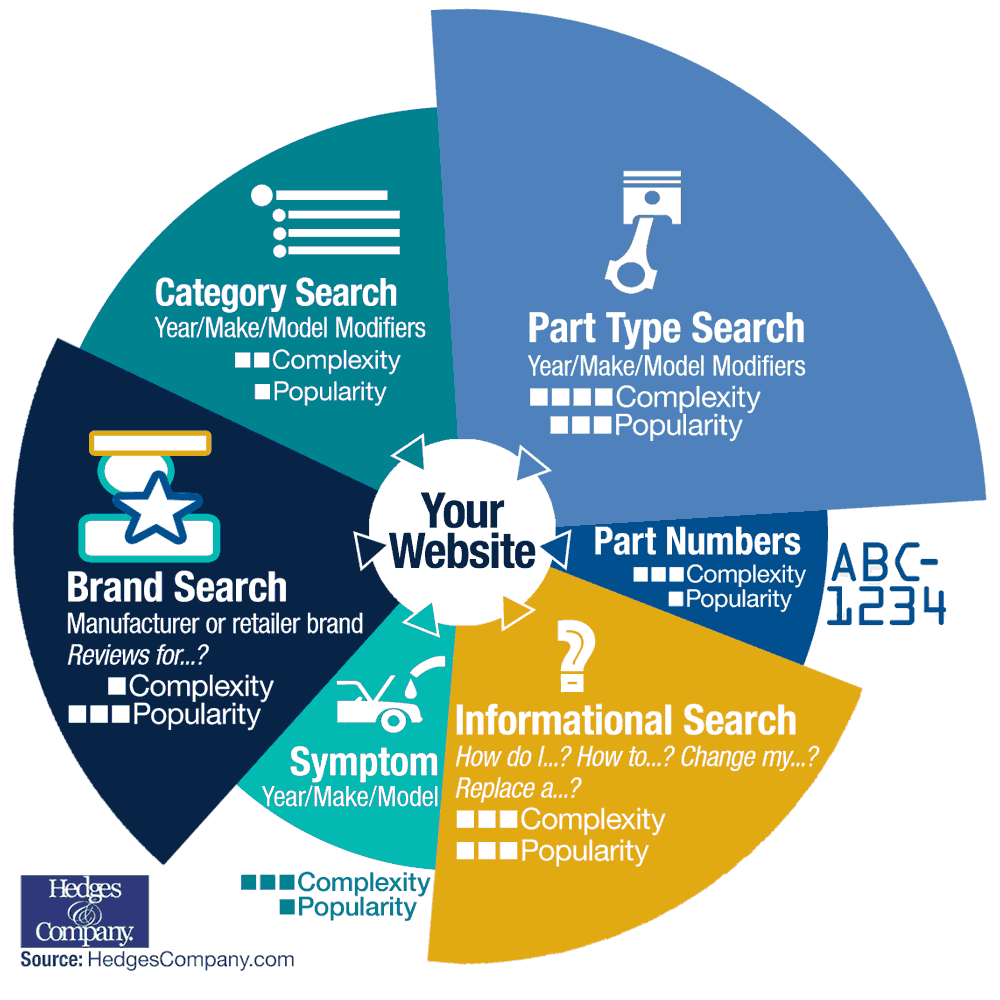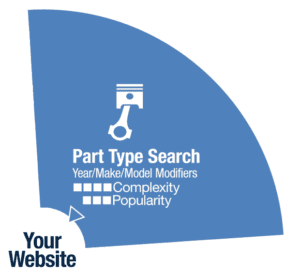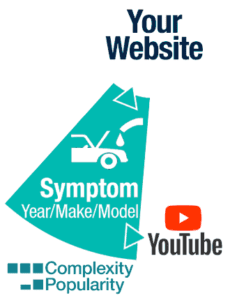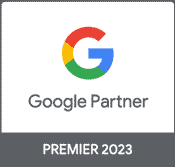Types of Google Searches for Auto Parts and Accessories
When marketing a website, it’s important to understand the different types of Google searches, how search intent matters, and how consumers use these six types of search queries. These are the basic types of Google searches used to find automotive aftermarket parts and accessories. (We’re excluding other types of search that don’t apply to this topic, like local “near me” searches for example.)
Google has used artificial intelligence (AI) for several years to do a better job understanding the context of search types. Today, Google is significantly better at understanding the relationship between search or user intent, and how that relates to vehicle model years, make and model, part types, part numbers, and any type of search query or search pattern.
Types of Google Searches: unique for auto parts and accessories
In this article we reveal how auto parts and accessories buyers search online and how we use search intent to create content for clients.

CLICK TO ENLARGE: Here are the six primary ways consumers search online for automotive parts and accessories.
These consumer search patterns are used every minute of every day on Google, Microsoft Bing and other search engines.
Just to keep this article short, we’re excluding local consumer search patterns and other less popular search types.
One thing to keep in mind is the importance of using PIES and ACES data for a website. Don’t use PIES data word-for-word, but use it along with ACES data to clarify a part’s fitment, description and other important pieces of data.
Another important factor in search is a site’s E-E-A-T, which stands for Experience, Expertise, Authoritativeness, and Trustworthiness. We won’t get into detail in this article but we have plenty of information on E-E-A-T on this website.
Below, we break down these types of Google search queries by popularity and complexity. We’ll show you how consumers use them and how these search patterns should guide your automotive Internet marketing.
Types of Google searches, volume and search intent
Low search popularity or search volume is not necessarily bad. Purchase intent is the key. Some consumer search patterns with low search volume have high purchase intent. That’s why knowing if a search is high-, mid-, or low-funnel matters.
These 6 types of search queries are valid for organic search (SEO) as well as managing paid search keywords (PPC). If you aren’t optimizing for these search categories, you’re losing valuable traffic that should be coming to your website.

CLICK TO ENLARGE: Part type search is probably the most popular of the consumer search patterns. It is the most complex, too.
Part type Google searches
Part type is the most popular consumer search pattern. This includes things like pistons, mufflers, fender flares, lift kits and so on.
This consumer search pattern is also complex because shoppers usually modify part type search with vehicle fitment. This can be make/model/year, type of transmission, 2 wheel or 4 wheel drive (also 2WD or 4WD), engine cylinders or displacement, jargon terms (like “JK” for 2007-2018 Jeep Wrangler), bed length and so on.
Examples of these part type search terms are “w218 Sprint Booster,” “6 inch lift kit,” or “bedliner for 2020 Ford F-150.”
Here’s an example of why this is one of the most complex types of search to optimize for. A retailer website with 50,000 SKUs can easily have hundreds of thousands–even millions–of variations in possible search terms with fitment information.
ACES fitment data is helpful when optimizing for part type search terms.
Optimizing for part type search is important for paid search campaigns as well as for search engine optimization (SEO).
Informational searches on Google

CLICK TO ENLARGE: Informational search is one of the most complex and popular types of search queries. This search is when consumers are trying to solve a problem. Many times these search queries lead to YouTube.
Informational Google searches patterns are done by automotive parts shoppers looking for general technical information. Many times the consumer has a problem with their vehicle and they’re searching for the solution.
Many of these types of Google searches are for “how,” “why” and “what.” You want content to show for search queries such as, “how to fix low oil pressure at idle?” or “why does my muffler sound loud?” or “what causes my spark plugs to foul?”
This consumer search pattern is often modified by vehicle fitment, which makes them complex. Examples include, “how to install side steps on a Ram 1500” or “how do you replace a Honda key fob battery?”
If you’re working on these types of search, you must do research on these search terms using Google Search Console. Other options are third party tools like Ahrefs. (Did you know you can use Google search suggestions to get ideas?)
Create content that solves people’s problems
Look for problems consumers need to solve. Also look at other questions asked. These searches are also great opportunities to use on-page schema and microdata.
Here’s something important to keep in mind. Many of these consumer search patterns end up on YouTube (the world’s second largest search engine). These search queries also end up on other sites full of technical information, including automotive forums. That’s why it’s important to optimize your paid campaigns or your SEO to show up for these search queries.
It’s also important to optimize your YouTube channel (did you know YouTube can be optimized for SEO?). Otherwise you run the risk of not showing up at all for these informational search queries.
If these search queries end up on YouTube, make sure they end up on your YouTube channel.
Types of Google searches: Brand search

CLICK TO ENLARGE: Brand search is one of the most popular types of search queries. It’s not complicated to optimize for, however.
For brand search queries, shoppers search either for the brand name of the retailer, or the manufacturer brand.
They also search for the product line brand of a manufacturer. For a non-automotive example, consumers search for “Nike running shoes” (the manufacturer) as well as “Air Max running shoes” (the Nike product line brand).
Types of Google searches for brand include searches for a phrase like “reviews for [Brand].”
Comparison types of Google searches are also popular. These are searches like “[Brand A] vs. [Brand B].”
Brand types of search queries are top- or mid-funnel searches. This equates to low or medium purchase intent.
In the case of “reviews for…” these searches are usually bottom-funnel searches. This consumer search pattern has high purchase intent. “Buy [brand name]” is also a high purchase intent brand search.
Purchase intent is important. Bottom-of-funnel, high purchase intent search has high clickthrough rates (CTR) on organic listings and paid ads. Website visitors with high purchase intent have higher conversion rates on your website.
Brand paid search brings up an ongoing question. Should you use paid ads for brand search when you have good organic rankings for your brand? If you want more sales at a very, very low cost, the answer is yes. We explain why here and here.
Search queries for automotive part numbers

CLICK TO ENLARGE: Part number search is complex and low volume. It also has very high purchase intent.
Part number search queries aren’t high volume search phrases. They’re important because they have high purchase intent. These are bottom-funnel searches. High purchase intent makes these search queries important when doing SEO for a website, when optimizing Google Merchant Center feeds, or optimizing paid search campaigns.
Shoppers searching by part number are educated shoppers. They’ve done their research.
Part number searches are for the aftermarket manufacturer part number, the OEM replacement part number, the original OEM part number, an OEM crossover part number or variations of the part number. Part numbers show differently on various websites because leading zeroes, spaces, prefixes or hyphens can be removed.
Part number searches can be very complicated search types. For example, 7893233004319, BD0431, 4212212, 000 421 22 12 and 000-421-22-12 represent the same part.
Your website’s schema needs to be optimized correctly to maximize your visibility for these search types. Schema also helps to maximize ROI for Google Shopping. To keep this article short, just give us a call if you want to know why schema is important for Google Shopping.
Search for symptoms and problems
Shoppers try to fix automotive problems with symptom search queries. These search queries are typically modified by vehicle fitment.
Examples of modified searches are “squealing brakes on Chrysler 300,” “check engine light Ford Fusion,” or “oil pan leak jku.” (JKU is a 2007-2018 Jeep Wrangler Unlimited 4-door.)
These searches are more complex. That’s because they usually include a specific symptom and a specific make/model or make/model/year.
These searches are great opportunities. The topics work well on a website’s blog. Shoppers end up on YouTube or on automotive forums if other websites aren’t optimized for symptom search queries.
Automotive product categories for category search queries

CLICK TO ENLARGE: Category search queries are not as popular and are usually top- or mid-funnel searches. However, this type of search is commonly overlooked and is a great opportunity to create additional inbound traffic.
Automotive category search queries are generalized searches. These search queries are usually similar to how products are grouped by categories on websites, such as the braking system, fuel injection, or drive train. Category search is often overlooked and a great opportunity to increase inbound traffic to a website. We’ve shown clients many, many times how inbound organic traffic can grow by optimizing for category search.
These types of Google searches are less specific than the part type search queries described at the top of this article. These category search queries are often modified by vehicle fitment.
Examples of these category search queries are “JK lift kits” or “Toyota fuel injection.” Other examples may be on your own website!
Category search queries are often top-of-funnel searches. They usually have low purchase intent. These search queries are performed by DIY and DIFM consumers. For local search activity, these searches can be consumers looking for auto repair shops, too.
These search queries can get specific with vehicle fitment, but they’re often not as specific as part type search.
Types of search queries: wrap up
We hope you found this information on types of Google searches interesting and helpful, and how it relates to automotive SEO services. If you did, please rate this article, below. If you have questions on search intent optimization for your website, your YouTube channel, or your paid search campaigns give us a call! We’re happy to answer any questions you may have.







Thank you for your very nice topic and Very significant Information for us.
Thank you for the inspirational article.
Do you have something similar or can you indicate customer behavior in terms of looking for used vehicles? thank you in advance